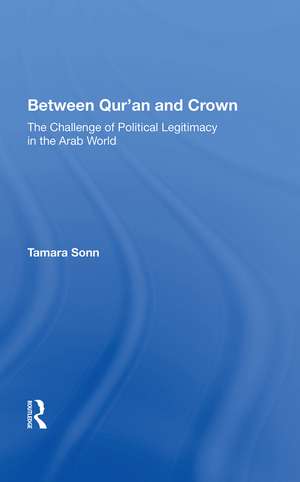Between Qur'an And Crown: The Challenge Of Political Legitimacy In The Arab World
Autor Tamara Sonnen Limba Engleză Hardback – 7 iun 2019
| Toate formatele și edițiile | Preț | Express |
|---|---|---|
| Paperback (1) | 261.33 lei 6-8 săpt. | |
| Taylor & Francis – 7 dec 2020 | 261.33 lei 6-8 săpt. | |
| Hardback (1) | 764.20 lei 6-8 săpt. | |
| Taylor & Francis – 7 iun 2019 | 764.20 lei 6-8 săpt. |
Preț: 764.20 lei
Preț vechi: 1027.40 lei
-26% Nou
Puncte Express: 1146
Preț estimativ în valută:
146.24€ • 151.82$ • 121.95£
146.24€ • 151.82$ • 121.95£
Carte tipărită la comandă
Livrare economică 22 martie-05 aprilie
Preluare comenzi: 021 569.72.76
Specificații
ISBN-13: 9780367012182
ISBN-10: 0367012189
Pagini: 280
Dimensiuni: 147 x 229 mm
Greutate: 0.45 kg
Ediția:1
Editura: Taylor & Francis
Colecția Routledge
Locul publicării:Oxford, United Kingdom
ISBN-10: 0367012189
Pagini: 280
Dimensiuni: 147 x 229 mm
Greutate: 0.45 kg
Ediția:1
Editura: Taylor & Francis
Colecția Routledge
Locul publicării:Oxford, United Kingdom
Cuprins
Preface -- Introduction: The Development of Secularism -- Islamic Decentralization and Initial Responses -- The Ottoman Interlude -- The Emergence of National Self-Awareness in Syria and Egypt -- The Arab Revolt and Its Aftermath -- The Legacy of Interwar Political Developments -- The Legacy of Interwar Religious Developments -- Straining Traditional Models -- Trends and Prospects for the Future
Descriere
The struggle for political legitimacy in many Middle Eastern countries today poses a dilemma for ruling elites. In order to maintain authority, leaders often must capitulate to Islamic universalist dogma, which may conflict with their own views of the state as well as threaten the legitimacy of other leaders in the region who are attempting to establish a secular, national basis for government. Tracing the roots of this dilemma in Middle Eastern history and Islamic philosophy, Dr. Sonn compares the contemporary Middle Eastern period to Europe’s “Age of Religious Wars†that preceded the emergence of the Western secular state. She describes how a process similar to the organic development of the secular state in Europe was interrupted in the Middle East by oppressive Western colonialism, which eventually led to the Muslim rejection of nationalism and all things “Western†and to the reassertion of Islam as the sole source of political legitimacy. The author shows how the philosophy of Islamic traditionalism opposes the two fundamentals of stable national political systems—a geographical limitation of authority and an institutionalized process for regular changes in leadership. Dr. Sonn bases her argument on an insightful examination of Middle Eastern history, from the formation and disintegration of the Ottoman Empire in the late nineteenth century to the present, and caps it with a detailed look at a possible solution to the dilemma: the teachings of modern scholars who advocate a new “Islamic realism†incorporating a limited definition of national identity and interests while retaining Islamic social goals.
